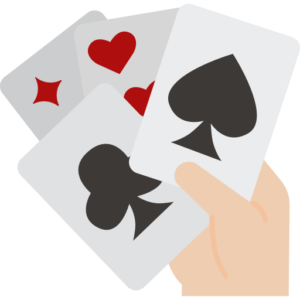Glossary Term
Quads
Quads
Used In: Poker
Introduction
In poker, “quads” is the term for four of a kind—when a player holds four cards of the same rank. For example, if you have four kings, you have quads. This hand is one of the strongest possible in most poker games and ranks just below a straight flush in standard hand rankings.
Quads are rare and can be hard to spot, especially if the board doesn’t show a pair or three of a kind. Because of this, they often catch opponents off guard. In games with community cards, like Texas Hold’em, quads can be made using a combination of your hole cards and the board, or even entirely from the board itself.
When multiple players have quads, which is rare, the winner is decided by the fifth card, called the kicker. But most of the time, having quads means you have a winning hand. Knowing how to recognize and play quads well can help you make the most of a strong position at the table.
In Depth Look
Quads, or four of a kind, is a poker hand made up of four cards of the same rank. This means you have all four cards of a particular value, like four eights or four aces. Because there are only four cards of each rank in the deck, quads are rare and powerful. In most poker games, quads rank just below a straight flush and above a full house, making them one of the highest possible hands. The strength of quads comes from their low likelihood and their ability to beat almost all other hands.
In games with community cards such as Texas Hold’em, quads can form in different ways. You might have one or two of the matching cards in your hand combined with the board, or all four could appear on the board itself. This can sometimes make it difficult to know who actually holds the winning hand, especially if multiple players share part of the quads. When quads are made using the board only, the winner is decided by the highest kicker card a player holds in their hand.
Playing quads effectively requires an understanding of the situation and the opponents. Because the hand is so strong, players often want to build the pot but avoid scaring others away too early. Checking or slow-playing can sometimes be a good strategy to encourage more bets. However, in some cases, betting or raising aggressively helps protect the hand from potential straights or flushes that might beat quads. The best approach depends on the game, the players, and the board.
Key Points:
- Quads consist of four cards of the same rank and rank just below a straight flush.
- In community card games, quads can be made from hole cards, the board, or both, affecting hand strength and winner decisions.
- Effective play with quads involves balancing pot-building with not scaring opponents away too early.
Mechanics
Quads form when a player holds four cards of the same rank, either entirely in their hand or combined with community cards on the table. Since there are only four cards of each rank in a standard deck, it’s impossible for anyone to have more than four of a kind. In games like Texas Hold’em, quads can be made using one card from the player’s hand plus three matching cards on the board, two cards from the hand plus two on the board, or all four matching cards showing on the board itself. When the quads come entirely from the board, every player still in the hand technically shares the same four of a kind, so the winner is decided by the highest remaining card, known as the kicker.
When comparing two hands with quads, the rank of the four cards determines the stronger hand—four aces beat four kings, and so on. If both players have quads of the same rank (which can only happen if the quads are on the board), then the fifth card, or kicker, decides the winner. The kicker is the highest unrelated card each player holds. This means that even with quads, a player must pay attention to kickers, especially in community card games, since a better kicker can turn the outcome. Understanding these details helps players make smarter betting and calling decisions when quads are involved.


Illustrated Example
You hold two cards in your hand: 8♥ 4♣. This gives you four eights—quads—because you combine the three eights on the board with the eighth in your hand. Your opponent has K♦ Q♣ in their hand. Both players share the same quads (four eights), but to decide the winner, the kicker comes into play. Your kicker is the 4♣, and your opponent’s kicker is the K♦. Since the king is higher than the four, your opponent wins this hand, despite both having quads.
This example shows how quads form and how the kicker affects the outcome. Even a very strong hand like four of a kind can lose if the kicker is weaker than an opponent’s. In this case, the board provides three of the four matching cards, and the players’ hole cards provide the final matching card and the kicker. Understanding this dynamic is key to knowing when to bet or fold with quads.
The Table explains the aforementioned:
| Player | Hole Cards | Board Cards | Best Five-Card Hand | Kicker | Result |
|---|---|---|---|---|---|
| You | 8♥ 4♣ | 8♦ 8♣ 8♠ K♠ 2♥ | 8♦ 8♣ 8♠ 8♥ K♠ | 4♣ | Lost (Kicker is lower) |
| Opponent | K♦ Q♣ | 8♦ 8♣ 8♠ K♠ 2♥ | 8♦ 8♣ 8♠ 8♥ K♦ | K♦ | Won (Kicker is higher) |
Player Perspective
Hitting quads is usually a moment of strength and confidence. Because quads are so rare, most players recognize them as nearly unbeatable. When you have four of a kind, you know you hold one of the top hands at the table. This can give you an edge in deciding when to bet or raise, aiming to build the pot without scaring opponents away too early. However, it’s important to stay aware of the board and the possibility of straights or flushes that could beat your quads.
At the same time, players need to think carefully about how to reveal the strength of quads during a hand. Playing too aggressively might cause others to fold, limiting your winnings. On the other hand, playing too passively can allow opponents to catch up or bluff their way into the pot. Good players balance these factors, using the size of the pot and opponents’ behavior to decide when to slow-play or bet hard. Reading the table and knowing when to protect your hand are key to maximizing value with quads.
Conclusion
Quads are one of the strongest hands in poker, offering a rare but powerful advantage. Understanding how quads form, how they rank against other hands, and the role of the kicker helps players make better decisions. While quads often win, smart play involves knowing when to build the pot and when to be cautious. Mastering these aspects can turn a great hand into a winning one.
The Top Online Casinos for Playing Poker
These platforms prioritize player satisfaction by providing intuitive interfaces, seamless gameplay experiences, and robust security measures to ensure a fair and enjoyable environment for all users.
No results were found!


Author
Branimir Ivanov | Senior News Contributor





